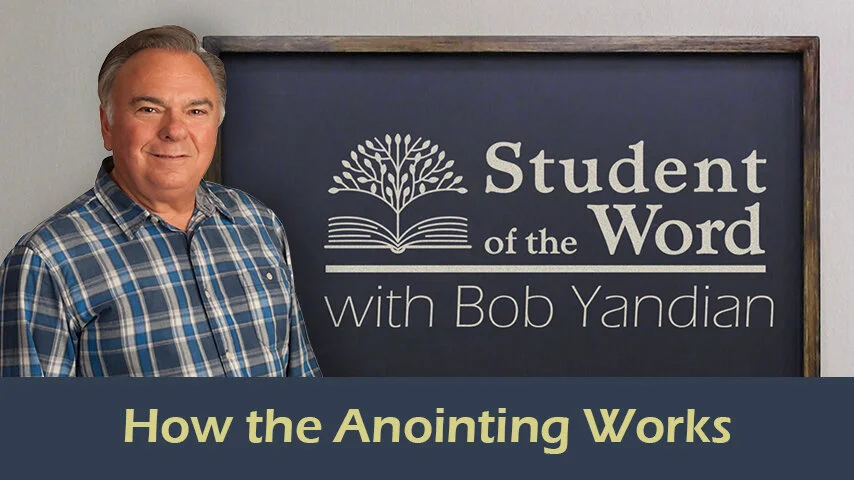How The Anointing Works
One minister when asked to define the anointing said, “We don’t know what it is but we do know when it aint.”
There is a presence of the Holy Spirit within us, called “the anointing” (1 John 2:7).
But there is a tangible presence of the Holy Spirit which can be sensed and sometimes seen as a cloud or smoke.
a. The Holy Spirit's presence in us is not felt and not tangible.
b. But the anointing we are discussing is the tangible presence of the Holy Spirit, sensed by ministers and many times by those attending.
c. The 9 gifts of the Holy Spirit are called manifestations.
d. When preaching, the anointing is an overwhelming confidence, and a presence of scriptural revelation.
Nine Points on What the Anointing is Not:
1. The Anointing is Not a Substitute for Preparation
a. Some preachers rely on Psalm 81:10, “Open your mouth wide, and I will fill it.”
b. “Study to show yourself approved to God, a worker who does not need to be ashamed, rightly dividing the word of truth.” (2 Timothy 2:15)
c. Although God can and does cover emergencies, don’t use the anointing as an excuse not to prepare.
d. The presence and working of the Holy Spirit help put the sermon together. He is also present when the minister presents the word.
e. The Holy Spirit’s power to help in study and presentation comes much by praying in the Spirit - in tongues. “For the stammering lips and another tongue He will speak to this people.” (Isaiah 28:11)
f. Study and inspiration do not need to compete with each other.
g. To not prepare and expect the anointing to bail you out is presumptuous. It will be evidenced by shallow preaching and shallow results.
h. But we should never be over-confident that what we have prepared needs no trusting in the Holy Spirit.
2. The Anointing is Not a Short-Cut to Success
a. Immature ministers think “If I had a great anointing I would be respected and have great success.”
b. But, without other areas of your life and ministry being matured, too much success could be tragic.
c. Your gift can take you where your character cannot sustain you.
d. There are no shortcuts or substitutes in ministry.
e. Anointing does not replace endurance, character, the fruit of the Spirit, honesty, humility, and a servant’s heart.
3. The Anointing is Not a Stamp of Approval
a. The tangible anointing is not God’s endorsement of a minister.
b. It doesn’t mean they are accurate in everything they do or say, or they are necessarily living right.
c. There is a difference between you being anointed and your message being anointed.
1. Some ministers, living in gross sin, preach great messages seeing people saved and healed.
2. Eventually though, that sin catches up with them.
3. Power, drunkenness, adultery, and money have destroyed many.
d. Samson is a great example.
4. Anointing is Not Synonymous With Specific Style
a. There are different expressions of God’s Spirit.
1. Some people love verse by verse teaching.
2. Others prefer inspirational preaching.
3. Some like prophesying and manifestations of the Holy Spirit.
4. Some like soft, quiet music. Others like it loud and energetic.
b. We all have personal preferences.
1. It’s important not to become closed-minded. That ours is the best.
2. That God can only work through our style of ministry.
c. God uses all types of ministry methods to reach different people.
5. The Anointing Does Not Make You Superior
Gordon Lindsay said, “Some spiritual moves have been blessed by God, then faded away because of the erratic and arrogant conduct of its leaders.” One such move occurred some years ago in America. We were joyful about the outpouring of the Spirit. But we soon saw changes that alarmed us. Some of the leaders claimed they were the powerhouse and all other churches were dried up. People were to come to them for recharging.
a. Someone said, “Arrogance is the only disease that makes everyone sick except the one who has it.”
b. The anointing is not given to create a celebrity but to empower a minister to meet people’s need
1. If God anoints you to flow in gifts of healings, it’s because He wants to heal sick people
2. If God anoints you to teach, it’s because He wants His people to have knowledge of Himself.
3. If God anoints you as an evangelist, it’s because He wants lost people to hear and be saved.
c. We are merely a wire for the power to flow through.
“But the manifestation of the Spirit is given to each one for the profit of all” 1 Corinthians 12:7
6. The Anointing is Not Synonymous With a Strong Personality
a. In the world, there are entertainers, political leaders, and ministers who have strong and captivating personalities. They are described as “charismatic.”
b. There could even be demonic influence over a person to exert control and influence over large groups of people. Hitler, some rock stars, and entertainers have commented “something just comes over me.”
c. Ministers who have strong personalities should use caution to not confuse their own personality with the anointing. The presence of the Holy Spirit is not given to enable us to dominate or dictate but to lead others into the presence of the Lord.
d. Paul said, “the authority the Lord has given me for edification and not for destruction.” (2 Corinthians 13:10).
7. The Anointing is Not Synonymous With Adrenaline
a. Anointing comes from the Holy Spirit.
b. Adrenaline comes from the flesh.
c. Adrenaline may be used to speak stronger and emphasize a point.
d. Anointing is personal, on you because of your gift.
e. Adrenaline pays short-term results but has long-term consequences.
f. Anointing takes time but produces long-term results.
g. Anointing makes you think God is better and higher than you.
h. Adrenaline makes you think better of yourself.
i. Adrenaline points people to you, Anointing to God.
j. Adrenaline creates success. Anointing creates fruit.
k. Adrenaline drives you. Anointing inspires you.
8. The Anointing is Not To Be Measured By The External Response of People
a. Jesus said, “Do not judge by appearance but by righteous judgment.” (John 7:24) Paul asked, “Do you see things by outward appearance?” (2 Corinthians 10:7)
b. It is wrong to evaluate anointing levels by whether they shout “amen” or are quiet. A quiet person might be quietly listening, while a more vocal person could be responding because they feel that is what they are supposed to do.
c. We all like to be enthusiastically received, but we are not preaching to have our ego stroked.
d. The only time people usually say ‘amen’ is when you said something they already know and agree with.
e. Others think if people fall in a prayer line it means there is a strong anointing. This has led some ministers to push people in healing lines. It is faith, not falling, that brings healing and blessing. Some people tell they faked a fall in a prayer line. They knew the minister wouldn’t move on until they fell.
9. The Anointing Does Not Exclusively Belong to the Five-Fold Ministry
a. Some think the anointing is only given to pulpit ministers, not with those who occupy the offices of helps, givers, mercy, or exhorters (Romans 12:6-8).
b. This is not the view of New Testament authors. “Now He who establishes us with you in Christ and has anointed us is God, who also has sealed us and given us the Spirit in our hearts as a guarantee” (2 Corinthians 1:21-22). “But the anointing which you have received from Him abides in you, and you do not need that anyone teach you, but as the same anointing teaches you concerning all things…” (1 John 2:27).
c. The function of a five-fold ministry office is important but so is the priesthood of every believer. The same anointing empowering and enlightening the prophet is the same anointing that empowers and enlightens a deacon, elder, and church class teacher.
What is the Anointing?
Martyn Lloyd-Jones said, “John’s words ‘unction’ and ‘anointing’ are just a very graphic way of describing the influence and the effect of the Holy Spirit upon the believer.”
Jesus was anointed (Luke 4:18; Acts 10:38) and He personally said, “I can of Myself do nothing” and “…the father who dwells in Me does the works” (John 5:30;14:10). Paul too understood the anointing and said he conducted his work in ministry by, “…striving with all the superhuman energy which He so mightily enkindles and works within me.” (Colossians 1:29, AMP).













